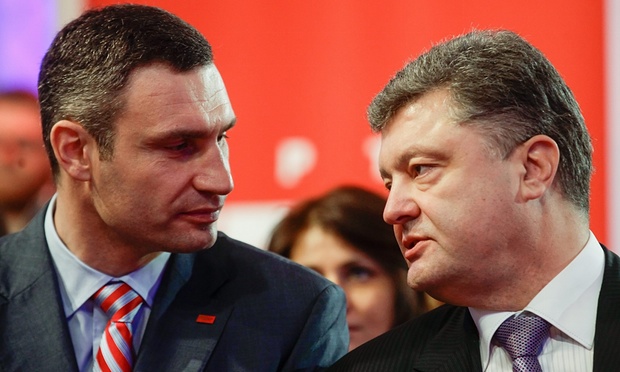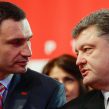
Ukraine’s Pro-Government Parties Join Forces Ahead of Local Elections
Publication: Eurasia Daily Monitor Volume: 12 Issue: 157
By:

The parties of President Petro Poroshenko, Kyiv Mayor Vitaly Klichko and Prime Minister Arseniy Yatsenyuk have joined forces ahead of the local elections scheduled for October 25. This is in order to defeat the Opposition Bloc, which is associated with the government overthrown in February 2014; oligarchic groups such as the Ukrainian Alliance of Patriots (UKROP), linked to Dnipropetrovsk-based businessman Ihor Kolomoysky; as well as more populist-leaning factions, such as the Radical Party and Yulia Tymoshenko’s Fatherland party. The Opposition Bloc is especially strong in Ukraine’s eastern areas, which are affected by the war with Russia-backed militants. A recent decision by the Central Electoral Commission (TsVK) not to hold elections in several population centers may further enfeeble the Opposition Bloc.
Klichko’s Ukrainian Democratic Alliance for Reforms (UDAR) formalized its merger with the Bloc of Petro Poroshenko–Solidarity at a unification conference on August 28. UDAR will receive only 30 percent of the spots on Solidarity’s list for the local elections, with the exception of Kyiv and Lviv, where lists will be divided half and half. But as compensation, Klichko replaced Yury Lutsenko as the unified party’s chairman (Rbc.ua, August 28). UDAR’s merger with Solidarity had been only a matter of time since Klichko bowed out of the presidential race in favor of Poroshenko in spring 2014.
Also on August 28, Yatsenyuk declared that his party, People’s Front, would not field its candidates in the local elections. He said that “democratic forces” should be united for the sake of reforms (Interfax, August 28). This is apparently the first step toward the People’s Front also merging with Poroshenko’s party. The news portal Lb.ua reported that Solidarity and People’s Front signed a secret unification agreement, according to which People’s Front representatives will be entitled to 25 percent of posts in the leadership of a unified party (Lb.ua, August 26). Lutsenko indirectly confirmed at the Solidarity-UDAR conference that a merger between the People’s Front and Solidarity was next on the agenda (Lb.ua, August 29).
It is likely to be more difficult for Yatsenyuk to sell his party’s merger with Solidarity than it was for Klichko. This is not only because of rivalry between the People’s Front and Poroshenko’s party, which began after Poroshenko’s election as president, but also due to ideological differences. Solidarity and UDAR are liberal parties, while People’s Front falls further down along the nationalist and populist spectrums. However, bandwagoning with Poroshenko may be the best option for Yatsenyuk if he wants to remain prime minister; in recent months, his own and his party’s popularity have dwindled to dangerously low levels. The People’s Front took more than 22 percent of the vote in the parliamentary election on October 26, 2014, ahead of Poroshenko’s Bloc with just below 22 percent. By contrast, this past summer, the People’s Front’s popular support has hovered at just 2–3 percent among the electorate (Forbes.net.ua, August 31).
With UDAR and the People’s Front politically neutralized, Poroshenko’s team can now presumably concentrate on fighting the Opposition Bloc in the densely populated Russian-speaking areas in eastern and southern Ukraine. The Opposition Bloc is especially popular in the provinces of Donetsk and Luhansk, which have been most directly affected by war. This party, headed by former energy minister Yury Boyko, are essentially heirs to the Party of Regions, which had been the ruling party until its leader and then-president, Viktor Yanukovych, fled Ukraine in February 2014. The Opposition Bloc scored 10 percent of the vote in the 2014 parliamentary election, more than any other opposition party. And its result is likely to be about the same this year, according to opinion polls (Podrobnosti.ua, August 27; Pravda.com.ua, June 11).
The government has tried to diminish the Opposition Bloc’s voter base, using security concerns as a pretext. The governors of the provinces of Donetsk and Luhansk, Pavlo Zhebrivsky and Heorhy Tuka, respectively, who were both hand-picked by Poroshenko, have asked the TsVK not to hold local elections in several government-held areas in the two provinces, citing security concerns (Ukrinform.ua, August 25). The TsVK agreed with their reasoning, ruling that there would be no elections not only in such government-held towns as Avdiyivka and Maryinka, which have been regularly shelled by the militants, but also in the relatively peaceful Artemivsk and Kostyantynivka.
At the same time, the TsVK allowed elections in the city of Mariupol (Mariupil), which is closer to the frontline, and is the biggest government-held city in the area (Cvk.gov.ua, August 29). Poroshenko called on the government to do its utmost to organize elections in Mariupol (President.gov.ua, August 29). The situation around Mariupol has been especially closely monitored by Western powers and the Organization for Security and Cooperation in Europe (OSCE) since last winter, when Russia-backed militants threatened to take this strategically important port city, and its eastern residential districts were shelled. A failure to hold elections there would have been viewed as a violation of the Minsk ceasefire agreements.
With the help of mergers with like-minded parties, and thanks to the elections not being held in rebel-held areas, Russian-annexed Crimea as well as many Ukrainian government–held areas where anti-government sentiment is especially strong, Poroshenko’s party is likely heading for a victory in the local elections. This will be the third victorious result for Poroshenko after the presidential and parliamentary polls last year. It will then be important to watch whether another victory by Poroshenko and his team may start to lead to excessive concentration of power in one party.




